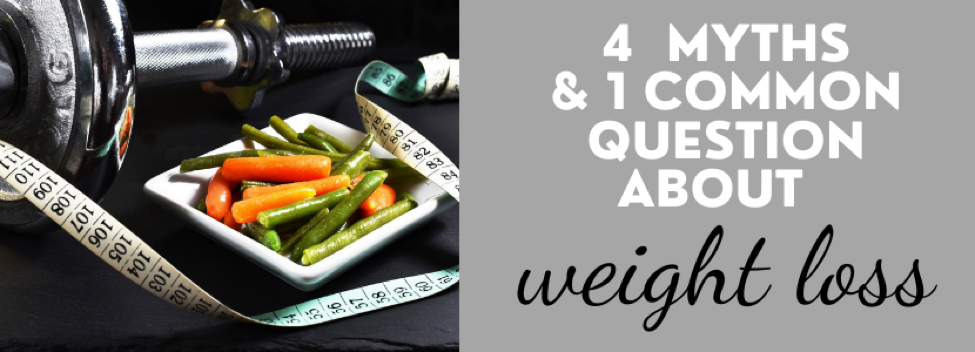
4 Myths and 1 Common Question About Weight Loss
It’s estimated that around half of all Americans are trying to lose weight. And slowly coming out of a pandemic in which an average of 29 pounds was gained over the past year (for 42% of the population), the number of people wanting to shed pounds may be much greater.
But losing weight can be quite the mystery.
There always seems to be another quick fix on the market, a new diet that promises to work swiftly, and at home fads that are supposed to do wonders. So what do you do?
Although the journey of weight loss is individual for everyone (diets, types of workouts, and weight loss strategies can vary depending on body type, body responses, genetics, and other health-related elements), there are some overall questions (and myths!) that apply to most.
Here are 4 myths and 1 common question Dr. Graves addresses when it comes to weight loss so you can gain understanding on how this sometimes perplexing process works!
Myth #1: Losing Weight Fast is Ideal.
Well, for our egos maybe! But when it comes to sustainable weight loss, losing a lot of weight in a short amount of time can work against our goals. Sure, you may like the fact that pounds are shedding (let’s say from a very restricted diet or intense fasting), but it can be more difficult to keep the weight off long term.
After a periods of diet-calorie restriction, the body many times wants to put weight back on. It’s a survival mechanism of the brain, thus why slow weight loss over time is more sustainable because you get less of the rebound reaction.
Dr. Graves sees more success with clients who lose weight slowly (1-3 lbs. for women and 2-4 lbs. for men per month) in which metabolisms have time to adjust to a new diet, exercise routine, and/or lifestyle for better long term management.
Make expectations realistic and gradually lose weight so you can keep it off.
Myth #2: Drinking cold water is an easy way to burn a lot of calories.
Let’s break this down. First, water is essential to flushing fat from cells so drinking it is vital for the body to lose weight.
However, it doesn’t matter all that much if it’s hot, cold, or tepid. Yes, cold water may require a bit of energy to warm in the body, but the extra burn is nominal (around 5-10 calories). So if ice cold water isn’t your thing, go ahead and pour yourself a room temperature glass instead.
Myth #3: Working Out Harder Always Leads to More Weight Loss.
Nope, not always.
Working out is an excellent way to tone and build muscles and shed extra pounds, but more doesn’t always mean more…well, in the way you may want it to.
As we age, stress plays a bigger role in weight management which means typical weight loss strategies may not always work like we expect.
The more stress the body takes on (whether it’s stress from daily living, poor diet, and/or more exercise), cortisol levels can rise and actually cause weight GAIN (especially around the belly)!
If you are not losing weight and are continuing to eat well and workout, stress may be the cause. Schedule a 15 minute free phone consultation with Dr. Graves to talk about if this could be the case for you and how naturopathic medicine may be able to help.
Myth #4: Weight Loss Only Refers to Fat Reduction.
In addition to fat, excess water retention is also a contributor to weight gain and can be a focus of sliming down.
Diets filled with lots of sugar, carbohydrates, salt, and alcohol with little water intake can result in water being retained throughout the body to keep it hydrated (up to 4 pounds a day!).
One clue to whether or not you are dealing with extra water retention is if your weight fluctuates rapidly (depending on a meal, if a woman is on her period, if you travel on a plane, and are taking certain medications).
Cleaning up your diet with less sugar, sodium, carbs, and alcohol and drinking plenty of water can help reduce water retention resulting in weight loss.
One Common Question…
What happens to fat when it’s “burned off”?
Under the right conditions, fat is released from cells and goes to the liver to be processed (it doesn’t just magically disappear!). From here, it is either reused throughout the body for energy or eliminated through a the bowels.
At least one bowel movement per day is vital for weight loss so fat waste can make its way out (although, more than likely you will not notice a larger movement even though you may be losing weight).
Do you have additional weight loss questions? Are you searching for what type of weight management plan may be best for your specific body?
Please call us at (303) 688-6698 or click here to schedule a free 15 minute phone consultation with Dr. Graves for further discussion and possible options.
The CNMA office provides naturopathic care, testing, massage, and holistic counseling to those in Castle Rock, Castle Pines, Highlands Ranch, Lone Tree, Centennial, Parker, Larkspur, Monument, Colorado Springs, and the greater Denver metro area. For those outside of these areas, virtual appointments are available.
REFERENCES:

Leave a Reply